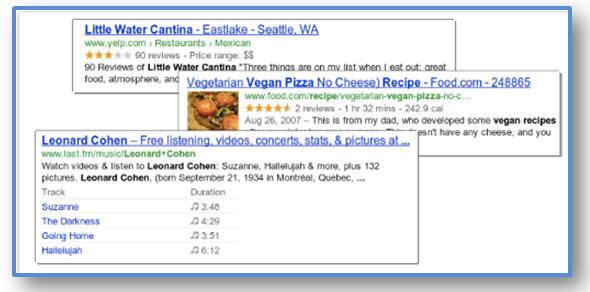Ever since the Hummingbird update, there has been a ton of Internet buzz about entity search. What is entity search? How does it work? And what exactly is an “entity”? However, the topic of entity search as it relates to e-commerce and Google Shopping has been neglected.
Everything you have learned to date about entity search, semantic search and the semantic Web also applies to e-commerce. The big difference in the shopping vertical compared to other search verticals is that all entities searched for are of the same type. Every product in Google is, in fact, an entity of type “product.” It should therefore be treated and optimized as such.

Although there are other search verticals in which all entities searched for of the same type (recipes, patents, images, maps, etc.), there is one key differentiator in e-commerce. In e-commerce, there is a unique global identifier that is leveraged across all major comparison shopping engines and search engines: namely, a GTIN or Global Trade Item Number (better known in the U.S. as a UPC). The schema.org definitions are shown below.

These global unique product identifiers take the guessing game out of comparing two products to determine if they are the same item, eliminating the problems typically associated with entity resolution and big data — all you have to do is compare the GTINs.
Not only do shopping engines like Google leverage this for determining if two products are identical in search, but they can leverage it for other purposes, as well. For example, what follows in the next section is a description of how Google may aggregate product reviews. (And it is a well known fact that reviews drive conversions.)
How Google May Aggregate Reviews
Google recently filed a patent (US patent 20120254158 A1) that was published on Oct 4, 2012, on aggregating product review information. The abstract reads as follows:
In other words, reviews are aggregated together for one product based on their associated product identifiers (such as a GTIN), and those reviews that do not have an identifier, or whose products cannot be specifically identified with one, may be discarded.
How Google Specifies Identifiers In Their Shopping Feed
The same philosophy applies to entry in Google Shopping. Google’s description of unique identifiers is as follows:

And, the ruling following the description reads as:
As you can see, the ramifications of not providing a GTIN can be quite severe.
With US e-commerce sales as a percent of retail sales sitting at less than 10 percent, one can see the enormous potential for future growth in this market. As more of the retail market moves online, it is clear that utilizing unique product identifiers and other types of structured data markup will be crucial to success in the global online marketplace.
At this point, you may be thinking, “So what? None of this really applies to me.” But here are a few other benefits of supplying this information, along with richly attributed and verified structure data, to the search engines.
1. Higher Click-Through Rates With Rich Snippets & Structured Data
Those now familiar-looking Rich Snippets we see on Google SERPs are known to increase CTR to your pages.
Not only are they more visually engaging to the user, they are also designed to give the users a better feel for what is on your page before they click on the listing.

2. Increased Visibility In Vertical SERPs
Supplying detailed attributes with your structured data (in the form of both semantic markup on your website and structured data in your product feeds) will increase the number of places where, and the frequency with which, you show up in search results.
The figure below illustrates how you cannot show up or even exist in the recipe vertical without marking up your recipe with structured markup.

Similarly, the Google Shopping screenshot below shows how you cannot show up in Google shopping as a query result for “black shoes” unless you populate the “color” attribute for shoes with the color black.

3. Increased Long-Tail Conversions
In the semantic Web, products with very rare or unique attributes will be more likely to surface when searched for. This generally indicates the long tail of search — for example, see the result below when searching for an item which has the properties of having peanut butter and jelly in stripes.

4. Improved SERP Rankings
This is something that has long been promised and highly discussed, such as increased rankings/authority for authorship or topic expertise. Although I have yet to see formal substantiation of the fact, it certainly makes sense, especially if you look at a comparison of algorithms such as objectrank vs. pagerank.

5. Increased Return On Advertising Spend
With Google’s move to paid inclusion, every product is a paid ad. The higher your product score (meaning the quality of your data, which includes factors such as data validity, granularity, richness of attributes, freshness of information and, of course, the correct identifier), the less you are likely to spend paying for your ad in Google Shopping.
Summing It Up
In summary, the following are some of the benefits that can be achieved by leveraging GS1 unique identifiers (GTINs, UPCS, EANs, JANs) and structured data for e-commerce:
- Higher Click Through Rates
- Better Visibility In Search Engines
- Lower Bounce Rates
- More Long Tail Conversions
- Improved Rankings
- Increased Return On Advertising Spend
As retail continues its shift to e-commerce and m-commerce and search continues its shift to a semantic paradigm, the need for solutions that leverage structured data will continue.
Lastly, as more of the retail market moves online, it is clear that there is a growing importance associated with providing and leveraging unique product identifiers and all their associated attributes as structured data in order to succeed in the global online marketplace.
Contributing authors are invited to create content for Search Engine Land and are chosen for their expertise and contribution to the search community. Our contributors work under the oversight of the editorial staff and contributions are checked for quality and relevance to our readers. The opinions they express are their own.



